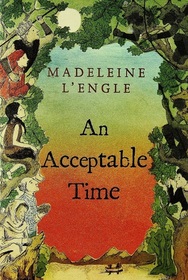This book mixes characters that L'Engle readers have previously met in both her Murry and Austin family books, although it's a stand-alone novel. Two college-age folks, Polly and Zachary, along with a family friend who is a retired bishop, pass through a "time-gate" into 3000 years ago, and a tribe of celtic-influenced Native Americans, some of whom, regrettably, think that strange and seemingly powerful strangers would make an excellent blood sacrifice to bring rain.
This book is more overtly Christian than I remember her earlier books being (although all of her writing is informed by her beliefs). However, it's the sort of Christianity that makes me think her books should be required reading for all the anti-science, xenophobic, war-mongering so-called Christians out there!
Still, there are a few moments when it gets out of hand - the bishop character has a tendency to preach, and there's a totally unneccessary little jab at the "evil" of fortune-telling (which I personally think is a totally harmless and entertaining [if a bit silly] activity.)
What I find a bit more off-putting (to me personally) than her religion is the portrayed centrality of family. Not just in this book, but in her writing in general. Family members Always love each other and get along fabulously. If she has a character that isn't in the family, and isn't a family friend (as opposed to a personal friend), they're bound to be bad news. If a character doesn't have a strong relationship with their family, they're bound to be sad, disturbed, and in need of help. When confronted with a dilemma, her young adult characters think of confiding in/consulting their parents or grandparents, first thing! (Eh, my mom would think it was just wonderful....but it's just not likely.)
Like I said, maybe it's just me... I've always been a very independent person; I left home very early, and although I love my immediate family and make an effort to stay in touch and see them at least once or twice a year, they're not central to my life, nor do they know every detail of what's going on in my life... which I find happy and normal!
Still L'Engle is a good writer, and this is a fast read... (it didn't feel like over 300 pages at all!)
This book is more overtly Christian than I remember her earlier books being (although all of her writing is informed by her beliefs). However, it's the sort of Christianity that makes me think her books should be required reading for all the anti-science, xenophobic, war-mongering so-called Christians out there!
Still, there are a few moments when it gets out of hand - the bishop character has a tendency to preach, and there's a totally unneccessary little jab at the "evil" of fortune-telling (which I personally think is a totally harmless and entertaining [if a bit silly] activity.)
What I find a bit more off-putting (to me personally) than her religion is the portrayed centrality of family. Not just in this book, but in her writing in general. Family members Always love each other and get along fabulously. If she has a character that isn't in the family, and isn't a family friend (as opposed to a personal friend), they're bound to be bad news. If a character doesn't have a strong relationship with their family, they're bound to be sad, disturbed, and in need of help. When confronted with a dilemma, her young adult characters think of confiding in/consulting their parents or grandparents, first thing! (Eh, my mom would think it was just wonderful....but it's just not likely.)
Like I said, maybe it's just me... I've always been a very independent person; I left home very early, and although I love my immediate family and make an effort to stay in touch and see them at least once or twice a year, they're not central to my life, nor do they know every detail of what's going on in my life... which I find happy and normal!
Still L'Engle is a good writer, and this is a fast read... (it didn't feel like over 300 pages at all!)




